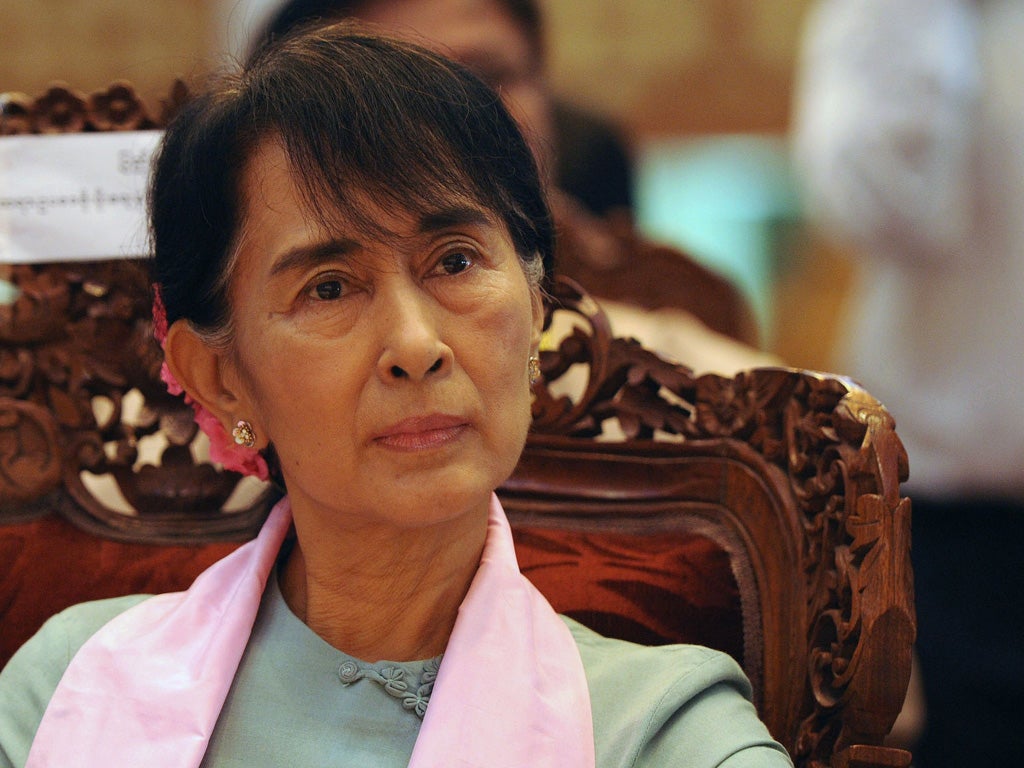Suu Kyi's party told it's too authoritarian as Burma's activists quit

Your support helps us to tell the story
From reproductive rights to climate change to Big Tech, The Independent is on the ground when the story is developing. Whether it's investigating the financials of Elon Musk's pro-Trump PAC or producing our latest documentary, 'The A Word', which shines a light on the American women fighting for reproductive rights, we know how important it is to parse out the facts from the messaging.
At such a critical moment in US history, we need reporters on the ground. Your donation allows us to keep sending journalists to speak to both sides of the story.
The Independent is trusted by Americans across the entire political spectrum. And unlike many other quality news outlets, we choose not to lock Americans out of our reporting and analysis with paywalls. We believe quality journalism should be available to everyone, paid for by those who can afford it.
Your support makes all the difference.The leadership of Aung San Suu Kyi's political party is facing a growing tide of resignations amid claims of authoritarianism as it attempts to replace ageing members of Burma's democracy movement with new blood.
About 130 members of Ms Suu Kyi's opposition National League for Democracy (NLD) resigned in south-western Irrawaddy Division last month while a further 370 members in the same area and 500 more in the northern city of Mandalay are threatening to follow suit, local newspapers have reported.
Some long-standing members have accused party leaders of abandoning them after years of service as the NLD selects new delegates for a first-ever party assembly in December or January. "I admit they were not democratically chosen," said Nyan Win, secretary of the NLD's assembly commission. "We appointed people who can oversee and supervise ahead of the assembly."
The controversy is the latest challenge for Ms Suu Kyi, who was elected as a member of parliament in the April elections, as she steadily makes the transition from an almost saintly opposition activist to a mainstream politician with every-day problems. She has dismissed the intra-party disputes as disagreements between dedicated party members and "self-interested people".
Disagreements became public last month when three long-time members in Pathein, a town famous for making umbrellas in the Irrawaddy Delta, accused party leaders of "undemocratic practices" in selecting new delegates. The central executive committee responded by dismissing all three and closing the local NLD headquarters, prompting further internal revolt.
The assembly is seen as crucial as the Nobel laureate looks to develop strategy ahead of a 2015 general election showdown with a ruling party dominated by former army generals.
The NLD is attempting to build up the ranks of new, younger members as the party ages: Ms Suu Kyi herself is 67 years old and her two most senior colleagues are even older. Following years of military repression, the NLD has found it difficult to recruit members. In the past, joining Burma's main opposition party typically meant a lengthy prison sentence. But following recent political reforms, authorities have become more tolerant of Ms Suu Kyi and her party prompting a flood of new members jockeying for position ahead of the assembly.
"All that is needed is for Suu Kyi to say that the process should be democratic … [because] it's probably right to say about 90 per cent of people join the NLD because they love [her]," Ko Ko Aung, an NLD member from Mandalay and one of the party's most vocal internal critics in recent weeks, told The Myanmar Times.
The attacks are yet to single out Ms Suu Kyi herself but there have been growing calls for her to intervene in what some party members see as a heavy-handed, authoritarian approach by the leaders around her. Although the NLD has faced external criticism over perceived authoritarian decision-making in the past, this is the first time so many voices have spoken out in public from within the party.
Aung Naing Oo, deputy director of the Vahu Institute, a Rangoon-based think-tank on Burmese politics and economics, said the party's problems should come as little surprise in a country dominated by military-style leadership for so many years.
"In authoritarian polity, both the opposition and incumbent government share some similar traits – top-down inflexibility – though they are politically at different ends of the spectrum," he said.
Despite recent turmoil, the NLD is considered a formidable political force likely to become even stronger as it enjoys new political freedoms in Burma. In April, it won every seat of 44 contested in a landmark by-election seen as a key test of ongoing government reforms as Ms Suu Kyi became a member of parliament for the first time.
Join our commenting forum
Join thought-provoking conversations, follow other Independent readers and see their replies
Comments